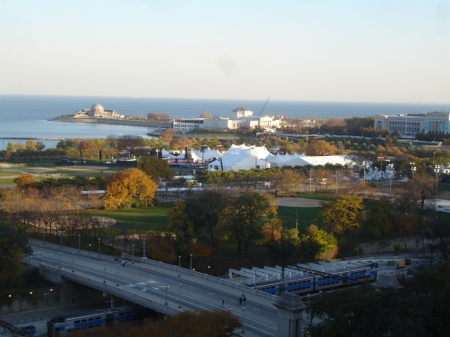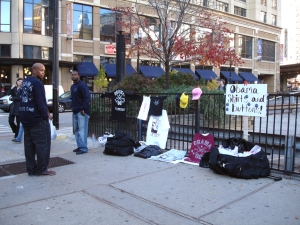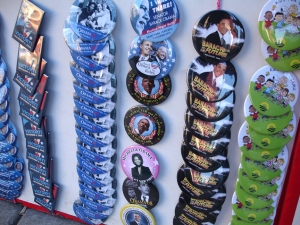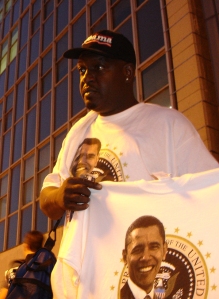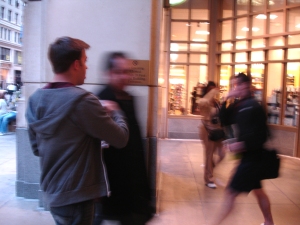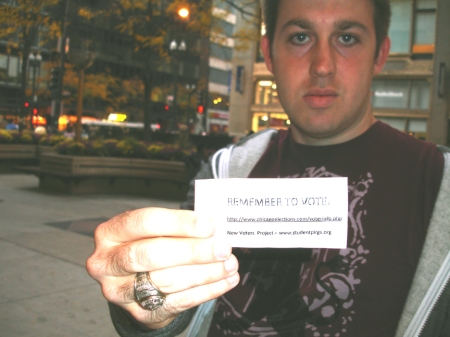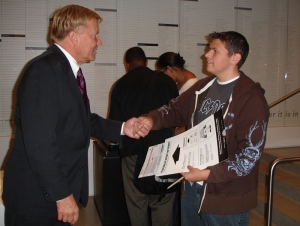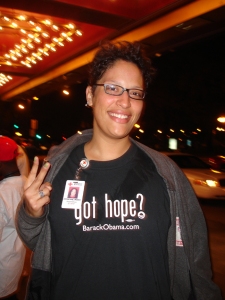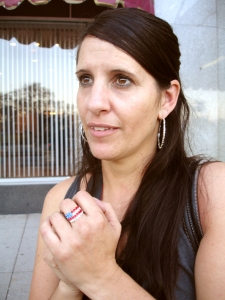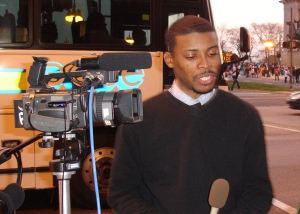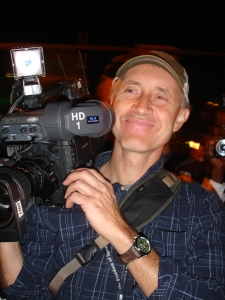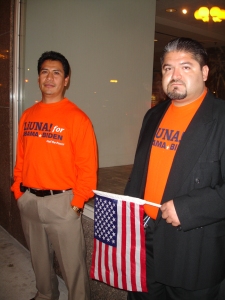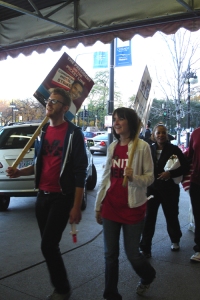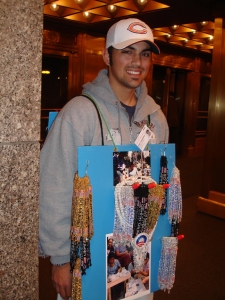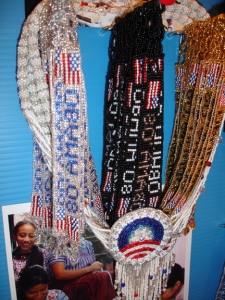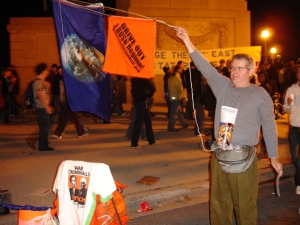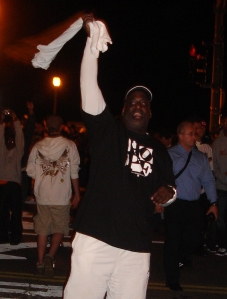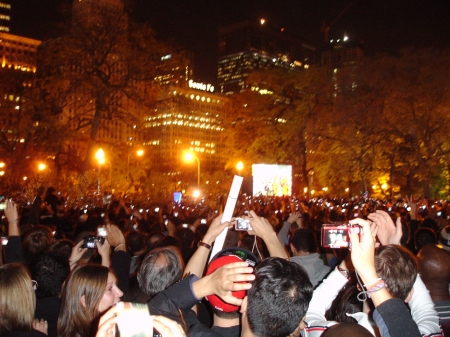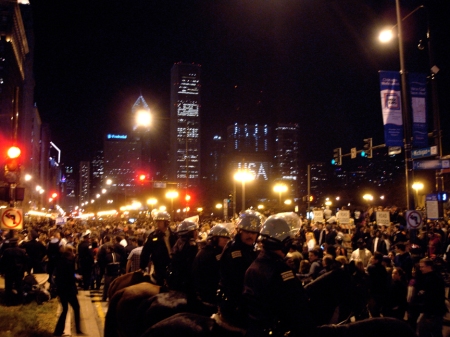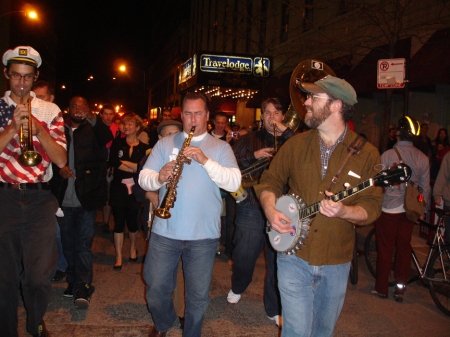Jan. 2, 2009 – Standing outside the Deluxe Diner on the North side of Chicago in Rogers
Park, Peter Magai Bul towers over the people around him. An acquaintance from
the neighborhood swerves around sidewalk pedestrians on his bike and
affectionately gives Bul a nod, calling him "Manute Bol" as he passes.
At 6 feet, 6 inches, Bul doesn't quite reach the retired NBA star's stature
at 7 feet, 7 inches. But they do have other things in common: They were both
born in Sudan and they both fled the brutal civil war. Now, in the U.S., they
both work as activists seeking to educate the community and create change in
their homeland.
Bul serves as president of the Ayual Community Development Association. Maketh
Mabior, a fellow Lost Boy and lifelong friend, described Bul as someone who
always has a plan, someone who has the answer and someone who works extremely
hard.
"He's somebody who would put himself on the line," Mabior said.
"He makes himself busy every day. Sometimes I say, ‘Peter, you have to
take a break.' The man is everywhere. He's like an ambassador."
Bul's actions reflect a need to create change. One of approximately 125 Lost
Boys of Sudan living in Chicago, 40 of who live in Rogers Park, Bul's vision
comes from an unbreakable bond with his fellow Lost Boys and those still in his
homeland.
In 1988 war came to Bul's village in southern Sudan. He was 6 years old.
"You have Africans fighting Africans because they see difference in
terms of religion. This is a religious war," Bul said.
Bul ran away with his mother and proceeded to walk for three months with
other children from his village to Ethiopia. But along the way his mother's leg
became infected and she could no longer walk. She rode on a truck carrying
water back to Sudan.
Bul continued on to Dimma, a refugee camp in the eastern part of the country.
He wouldn't see his immediate family again for 20 years.
Humanitarian groups estimate that the ongoing Sudanese conflict between the
government-run Islamic military of the north and the non-Arab Africans of the
south has killed nearly 2 million people and displaced 4 million people. The
United States Committee for Refugees and Immigrants says that one in five of
the southern Sudanese population has died since the war started in 1983.
The south suffered, not just military-wise; no development took place in
southern Sudan, no investment, and little employment. Schools were not built
and there are no clinics. People are unable to grow crops and starvation grew
increasingly common. Of the children in southern Sudan, boys were either targeted
for military recruitment or killed. Girls were taken as slaves.
The youngest of nine children, two of Bul's siblings died of illnesses
before he was born. One of his older brothers fought in the southern rebel
army. He now lives in Nairobi,
Kenya with his
wife. Bul's father died in 1991 in the war.
The vast majority of those who fled Sudan were between the ages of 5
and 12. They slept on the ground or in trees. There was no shelter, no
infrastructure.
"We lost a number of children. Some died because there was no water and
so forth," he said.
Bul lived in the Ethiopian refugee camp for four years.
"When it rained, you were only sleeping under a tree. Because you are
sleeping outside, you get sick and you die. We saw hundreds of children die
each day from hunger and disease," Bul said. "We were only children.
This is not something you would forget."
The few adults present served as caretakers. Among the children, they
selected their own group leaders, who divided the children into smaller groups
and charged them with tasks. They would set out into the forest to collect
wood. Some made small huts to sleep under. Others built fires and cooked for
the group.
"Since we lost hundreds of children each day, and there were no adults
to bury those children, you'd have to look within the group and send people to
carry those dead bodies to the cemetery and bury them," Bul said.
Bul, who was a group leader, would report back to the adults on the status
of the children – who was alive, who died, what they needed.
Because many of the children came from different villages, they spoke
different Afro-Asiatic languages. There were even different dialects within
those language variations. They learned to communicate with one another using
hand gestures and teaching one another words.
In 1991, the refugees were forced to leave Ethiopia due to civil unrest. They
returned to Sudan,
but not before crossing the Gilo
River at the
Ethiopian-Sudanese border. Thousands of children died in that river because the
majority of them didn't know how to swim.
It was only a few weeks after returning to eastern Sudan before the group
left again, this time walking hundreds of miles to Kenya.
Bul lived in Kakuuma Refugee Camp in northern Kenya for nine years where they
received aid from the U.N. and the Red Cross. He started school in 1993.
Instead of going a week or more without food, now they'd only go a couple days
without eating. The rations sufficed. They didn't worry about picking wild
berries or hunting for meals – which often made children sick in Ethiopia.
"It was better than Ethiopia,
but it was still a refugee camp. Many of the children still died from
disease," Bul said.
A number of girls who made the journey were placed with host families in Kenya. The Lost
Boys, as they came to be known, stuck together – they had become one another's
family. They lived in the camp among other refugees from Congo, Ethiopia and
Somalia. There was no work for adults. Some materials were provided for them to
build common areas.
"We'd go to the community and help with building those houses," he
said. "But it wasn't secure. The local people sometimes were attacking us
because they were struggling, too. They didn't have food. So when we were given
food by the U.N., sometimes at night they'd come in looking for something to
survive."
There was never comfort, never a period of safety or rest for Bul and the
other Lost Boys. A question crept into his mind: "Will these atrocities end
with us?"
"I think when you live in that situation, seeing so many bad things,
seeing children dying, children giving up, and you have been in that situation
for a number of years – you don't worry about when your day comes. You're not
even scared anymore," he said. "For me, I wasn't concerned with what
I had to deal with each day."
His concern was with what children would have to deal with in the future.
There were only between 12,000 and 16,000 Sudanese children left at that point
out of the 27,000 who originally fled Sudan.


Photo by: Erica Christoffer
Lost Boy Peter Magai Bul works from his Rogers Park home to improve life in his homeland of Sudan.
Bul could easily have been one of those who didn't survive, and he knows it.
He recalled becoming very ill on the trek to Kenya in 1992, so ill that he
couldn't walk. They had a blanket that they used to carry dead bodies out to be
buried. Sometimes they'd carry their sick in the same blanket. Bul didn't want
to set foot in that blanket. He forced his body to keep going.
"I remember when we stopped, we were walking at night and people didn't
want to be attacked. I couldn't walk and I didn't want to die with anyone. Some
of the guys wanted to be with me. I told them to let me rest here," Bul
said. The next day he was on the road by himself. He collapsed under a tree on
the side of the road.
"I don't know when the ambulance came," Bul said. "Someone
had told them there was someone under the tree. The next morning I woke up in
the bed. I wondered, ‘Did they capture me?'"
Then the doctors came in and Bul learned he was in Kenya. A month
later he was reunited with his group at the refugee camp. They thought he had
died. His clothing had been given away to other people.
In 1999, the decision was made to bring 4,000 of the Sudanese refugee
children to the United States. "We had to go through different
interviews," Bul said. They chose boys who they believed would thrive best
in America. He remembers the day the acceptance letters arrived at the refugee
camp. The young men stood in a circle as the delivery person called out names.
Some would pray before opening their envelope.
At the age of 19 after living in refugee camps for 13 years, Bul was one of
the lucky ones chosen to go to the U.S. It was a bittersweet
realization for Bul, who was happy he received the opportunity, but heartbroken
that he was leaving the children he cared for.
In 2001 Bul became one of seven original Lost Boys to resettle in Chicago.
His English was thick with a slight British accent. The boys had never been in
an urban setting; never seen snow.
"Every time you met an American they don't want to talk to you because
you don't speak English well. It was so hard to talk to them. I think that was
the most difficult adjustment," Bul said.
Bul started attending classes at Truman College in 2002, majoring in
political science and pre-law. He's now transferring to University of Illinois,
Chicago. He got
a job at a hotel and moved in with other Lost Boys in Roger Park. Things
started coming together.
Yet Bul never forgot those he left behind in the refugee camp.
He began his work with the Ayual Community Development Association, a
non-profit run by Lost Boys and American volunteers from all over the country.
The group draws attention to the situation in southern Sudan and raises money
to improve conditions and provide education for those still displaced. They
have already built Pongborong Primary School in southern Sudan, fully stocked
with books.
"By giving them the education, it gives them the opportunity to learn
about Sudan itself," Bul said. "People don't have the knowledge. They
don't have the opportunity to learn that this is a country with different
backgrounds. This is a diverse country."
Mabior, who grew up in the same Sudanese village as Bul, made the trek to
the refugee camps in Ethiopia and Kenya side-by-side with Bul. Their
experiences have mirrored each other for 20 years. He, too, was a chosen Lost
Boy who came to live in Chicago
and works with the Ayual Community Development Association.
Bul has always been a leader, Mabior said, back in the refugee camps when he
took care of other children and today as he organizes the community and speaks
on the issues facing Sudanese people.
"Peter has a vision," Mabior said of his friend. "We are
going to change things in our country."
In December 2007, Bul returned for the first time to Kenya and Sudan. He saw
his mother for the first time in 20 years. "I was shocked that I could not
recognize the village where I was born," he said.
Villagers voiced concern to him that if elections are not carried out
properly next year in Sudan, then the war will continue.
"This is about equality. People should be given the opportunity to
govern if they are capable," Bul said. "There is a little peace now;
so many people in the refugee camps are going back."
For three months after making his homecoming, Bul said he could not talk
about it. He was in shock, having seen the continued problems in his homeland.
In his head, though, he was planning – planning what he could do next to
help. People are tired of war. Tired of refugee camps. They are ready for
change.
Bul gave his word to support them. It is his lifelong commitment. His quest.
"We are the richest country in the world in terms of resources,
but those resources have been misused. Then there is Sudan, one of the poorest countries
in the world. We can use those resources to help them," Bul said.
"Giving people the knowledge will help in the long term. Education."
"I have to do my best to help. I was there, I've seen it."
Bul helped coordinate the Lost Boys' Hope of Sudan Celebration, which will
take place this Sunday from 2 p.m. to 6 p.m. at Truman College, 1145 W. Wilson
Ave. The event marks four Sudanese cultural events – the Lost Boys' birthdays,
Sudan's Independence Day, the Sudanese New Year, and the signing of the
Comprehensive Peace Agreement. Hosted by Chicago
Bull Luol Deng, the event is free and will feature traditional Sudanese food.
All donation will benefit the Lost Boys Scholarship Fund. For more
information, visit lostboyschicago.com.
Categories:
Editor’s Choice Global North Side Public Social Issues
Tags:
human rights lost boys of sudan rogers park sudan truman college
]]>

 Flanigan: Our team will stay connected to the store and we’re going to be working with an energy contractor to do the work. We will actually see the work as it happens. We are in a position to stay connected and we’re hoping that relationship drives the accountability once the mob is over.
Flanigan: Our team will stay connected to the store and we’re going to be working with an energy contractor to do the work. We will actually see the work as it happens. We are in a position to stay connected and we’re hoping that relationship drives the accountability once the mob is over.




 Illinois’ historic Governor’s Mansion
Illinois’ historic Governor’s Mansion Lincoln bedroom at the Illinois Governor’s Mansion
Lincoln bedroom at the Illinois Governor’s Mansion

